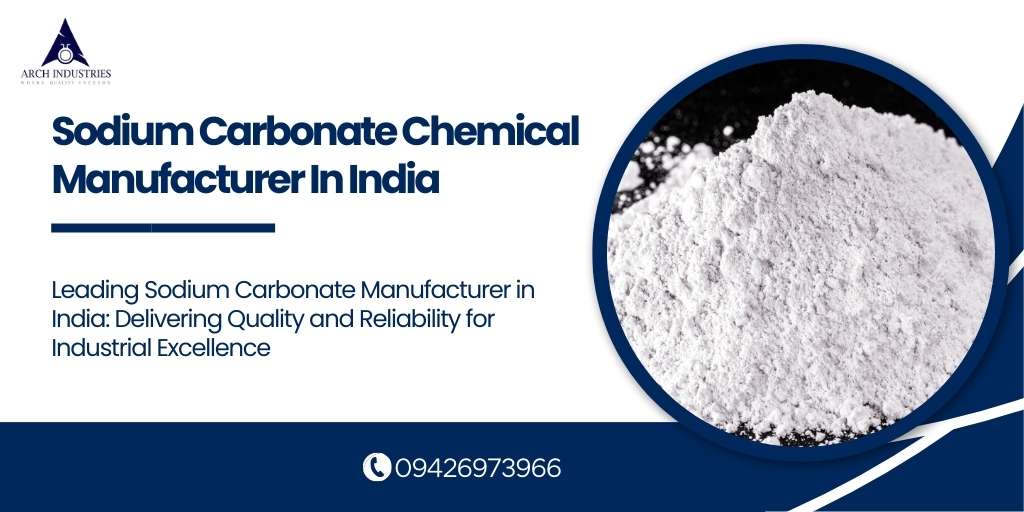
Table of Contents
- The Role of Sodium Carbonate in Everyday Products
- What is Sodium Carbonate?
- Applications of Sodium Carbonate
- Benefits of Sodium Carbonate
- Sodium Carbonate Chemical Manufacturer in India
- How Sodium Carbonate is Produced
- Comparison of Sodium Carbonate Production Methods
- Frequently Asked Questions (FAQs)
- Conclusion
The Role of Sodium Carbonate in Everyday Products: What You Should Know
Sodium carbonate, often referred to as washing soda or soda ash, is a versatile chemical compound widely used in various industries. As a sodium carbonate chemical manufacturer in India, we understand the crucial role this substance plays in everyday products and applications. In this article, we will explore the many uses of sodium carbonate, its significance, and why it is an indispensable part of our daily lives.
What is Sodium Carbonate?
Sodium carbonate (Na₂CO₃) is a white, odorless powder or granular material that is highly soluble in water. It is produced through a process called the Solvay process, which involves the reaction of sodium chloride, ammonia, and carbon dioxide.
Applications of Sodium Carbonate
Sodium carbonate is used in a wide array of industries due to its unique properties. Here are some of the key applications:
-
Glass Manufacturing
- Sodium carbonate is a crucial ingredient in the production of glass. It acts as a flux, lowering the melting point of the glass mixture and making the process more efficient.
-
Detergent Industry
- Many detergents and cleaning products contain sodium carbonate. It helps in softening water, allowing detergents to work more effectively. This is particularly useful in areas with hard water, where the presence of minerals can interfere with the cleaning process.
-
Pulp and Paper Industry
- In the paper industry, sodium carbonate is used in the pulping process to break down lignin and separate it from cellulose fibers. This is essential for producing high-quality paper.
-
Water Treatment
- Sodium carbonate is used in water treatment to control pH levels. It helps in maintaining the alkalinity of water, which is crucial for preventing corrosion and ensuring the effectiveness of other water treatment chemicals.
-
Food and Beverage Industry
- Sodium carbonate is used as a food additive for pH control and as a leavening agent in baked goods. It is also used in the production of sherbet and other confectionery items.
-
Textile Industry
- In textile manufacturing, sodium carbonate is used in the dyeing process. It helps in fixing dyes to fabrics, ensuring vibrant and long-lasting colors.
Benefits of Sodium Carbonate
- Efficient and Cost-Effective: Sodium carbonate is an economical solution for various industrial processes. Its ability to lower melting points and soften water makes it a cost-effective choice.
- Versatile: Its diverse applications make it a staple in many industries, from glass manufacturing to food production.
- Environmentally Friendly: Compared to other chemicals, sodium carbonate is relatively benign and can be used safely in many applications.
Sodium Carbonate Chemical Manufacturer in India
As a leading sodium carbonate chemical manufacturer in India, we are committed to providing high-quality products that meet the needs of various industries. Our state-of-the-art facilities and expert team ensure that our sodium carbonate meets the highest standards of purity and efficiency.
How Sodium Carbonate is Produced
The production of sodium carbonate typically involves the Solvay process, which includes the following steps:
- Brine Preparation: Sodium chloride (salt) is dissolved in water to create brine.
- Ammonia Absorption: Ammonia is introduced into the brine solution, which absorbs the ammonia to form ammoniated brine.
- Carbonation: Carbon dioxide is passed through the ammoniated brine, leading to the formation of sodium bicarbonate and ammonium chloride.
- Heating and Decomposition: The sodium bicarbonate is heated to decompose it into sodium carbonate, water, and carbon dioxide.
- Purification: The resulting sodium carbonate is purified to remove any impurities.
Comparison of Sodium Carbonate Production Methods
| Method | Description | Advantages | Disadvantages |
|---|---|---|---|
| Solvay Process | Chemical reaction of sodium chloride, ammonia, and carbon dioxide | High yield, cost-effective | Energy-intensive, ammonia recovery needed |
| Leblanc Process | Reaction of sodium chloride and sulfuric acid | Historical significance | Environmentally harmful, obsolete |
| Mineral Processing | Extraction from natural deposits | Environmentally friendly | Limited availability of deposits |
Frequently Asked Questions (FAQs)
-
What is sodium carbonate used for?
- Sodium carbonate is used in various industries, including glass manufacturing, detergent production, water treatment, and food processing.
-
How is sodium carbonate produced?
- Sodium carbonate is primarily produced through the Solvay process, which involves the reaction of sodium chloride, ammonia, and carbon dioxide.
-
What are the benefits of using sodium carbonate?
- Sodium carbonate is efficient, cost-effective, versatile, and relatively environmentally friendly compared to other chemicals.
-
Why is sodium carbonate important in the glass industry?
- Sodium carbonate acts as a flux, lowering the melting point of the glass mixture, making the production process more efficient.
-
How does sodium carbonate help in water treatment?
- Sodium carbonate helps in maintaining the alkalinity of water, which is crucial for preventing corrosion and ensuring the effectiveness of other water treatment chemicals.
Conclusion
Sodium carbonate is an essential chemical compound with a wide range of applications in various industries. As a sodium carbonate chemical manufacturer in India, we are proud to contribute to the production of this versatile substance, ensuring that it meets the highest standards of quality and purity. Whether it’s in the production of glass, detergents, or food, sodium carbonate plays a crucial role in our everyday lives.
For more information on the applications and benefits of sodium carbonate, you can refer to resources such as Chemical Industry Journal and Sodium Carbonate Association.
By understanding the role of sodium carbonate, we can appreciate its significance and the numerous ways it enhances our daily lives.

